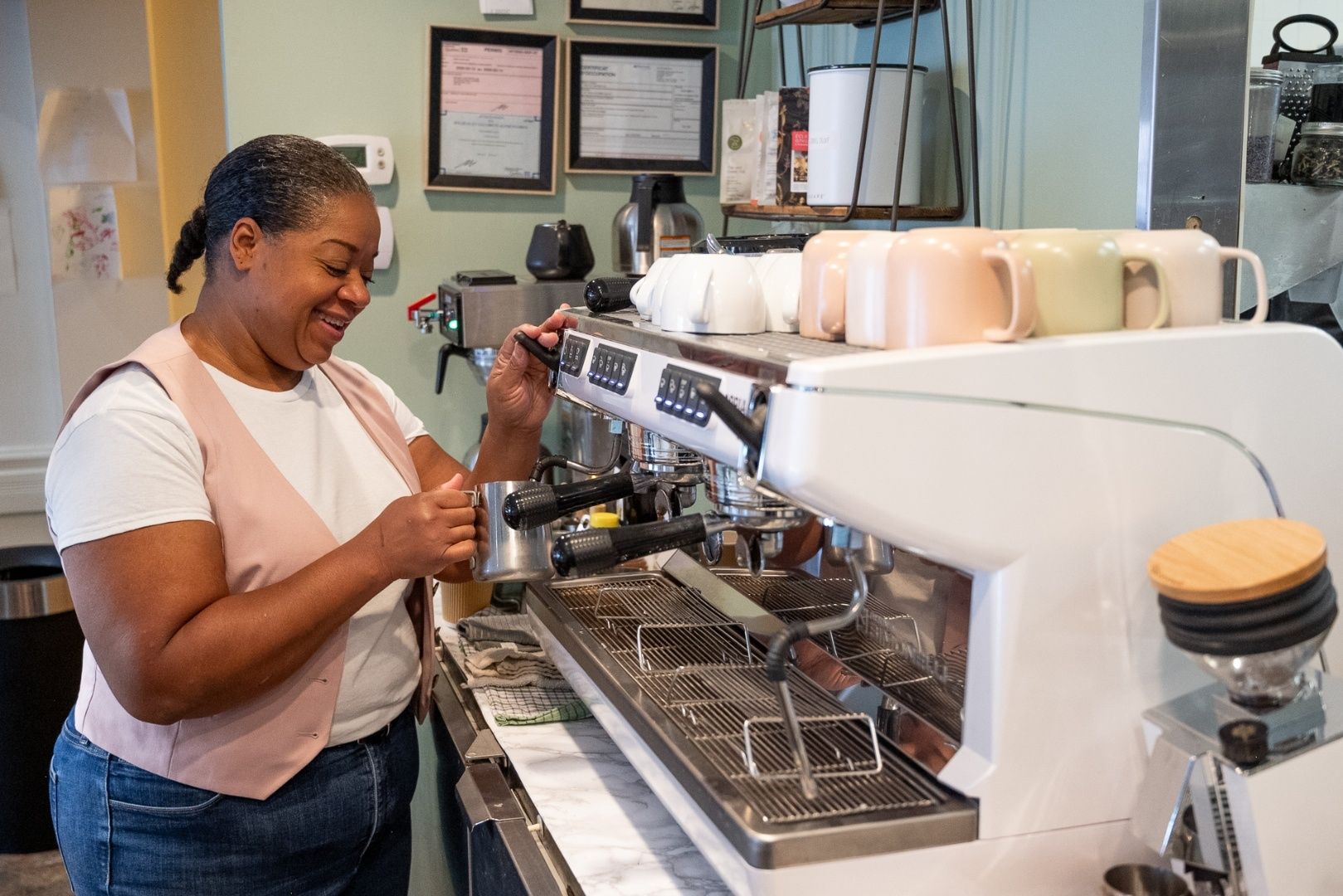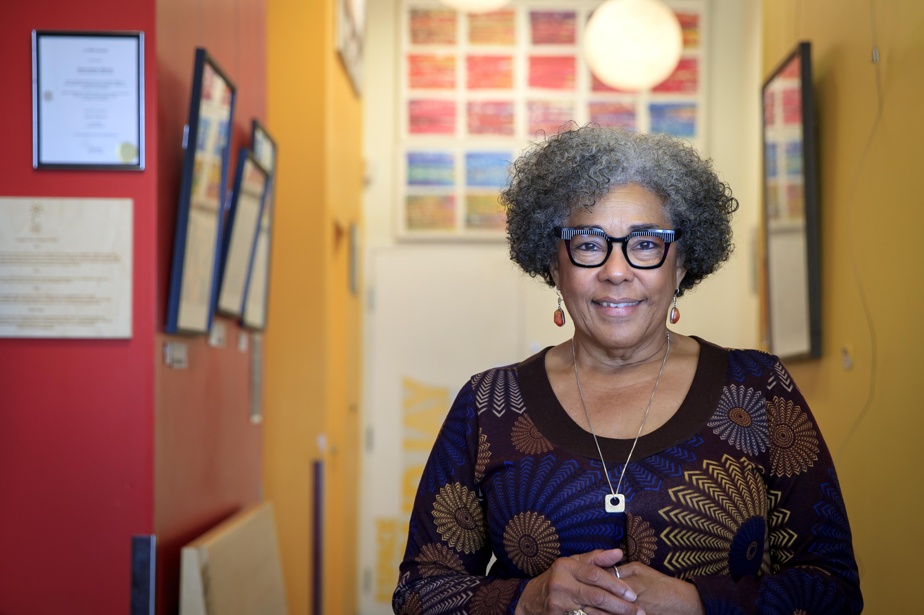“What I like about these girls is that they're a Vibe Of sisterhood. ” This is how Theryanne describes her relationship with the girls in the collective she is a part of. The Voice of Young People Matters is a group of activists who fight against sexual violence in schools, more specifically at the elementary and secondary levels.
This organization is made up of 23 young women. They have been making representations since 2018 by calling for a provincial framework law against sexual violence in elementary and secondary schools. Today, they host conferences, workshops and various other activities, while raising young people's awareness of this issue.
As the evening progressed, Kenza, Sha'nyce, Theryanne and Nerlande arrived one after the other in the studios of La Converse. Most of them have been involved in the collective since its foundation and take the time to present their journey to us and to tell us about their reality.
Actors of change
Kenza is a photographer in her spare time; Sha'nyce is a hairdresser; Theryanne is a student; and Nerlande loves creating content. “There is so much to say about each of the girls here!” says Kenza, cheerfully. The Montrealer of Moroccan origin is sure of herself: each person present is unique. In front of her, Theryanne answers her with a laugh: “There is also so much to say about you! ”
Kenza
When she was a CEGEP student, Kenza and a few of her friends created a podcast about social justice. In fact, that's how she got to know the collective, because some of its members contacted her to find out more about her involvement. “We were offered to be part of the group, with the others on the podcast. I was really interested, I wanted to get involved in the cause.” That's how the student joined The Voice of Youth Matters.
Between attending college and developing her passion for photography, Kenza has a busy life. She says that, for some time, she has been questioning her identity and trying to reconnect with her Moroccan roots. “When you are an immigrant and you grow up in a multicultural country, it can be difficult to reconnect with your identity; we ask ourselves a lot of questions,” she explains.
Sha'nyce
A full-time hairdresser, Sha'nyce says that school wasn't really for her. “After a year of higher education in special education, I decided to quit and focus entirely on hairstyling. I was already doing it next to school; it has been my passion for a long time,” she explains. She tells us that she finds it ironic, because she did not like hairstyling from the start. “My mother is also a hairdresser. At first I hated it. I never imagined working in this environment,” she says.
Today, Sha'nyce speaks up a lot for the collective. Very involved, she explains that it is because she “takes to heart this cause which, in her opinion, should raise everyone's awareness from an early age.”
Theryanne
In her second year in human sciences at CEGEP, Theryanne has a great interest in criminology and helping relationships. In fact, this is one of the things that pushed her to get involved in the collective. “I have been there since long before the creation of the group, for much more than five years,” she emphasizes. I think that what appeals to me the most, beyond the passion I have for the cause, is the feeling of feminine solidarity that exists between us.”
Of Haitian and Dominican origin, Theryanne is delighted to have found herself in a healthy sorority by getting involved in the group. “It allows us to heal from certain ailments that we may experience as we grow up, in a certain way,” she adds.
Nerlande
Also involved since the creation of the project, Nerlande is passionate about creating content. “I have a YouTube channel where I post vlogs,” she tells us, half embarrassed, half cheerful. Participating in awareness-raising activities allows her to go beyond her limits. “My goal here is to get out of my comfort zone and get involved in significant social change,” she says.
Of a reserved nature, Nerlande explains how the collective allowed her to assert herself. “By speaking in public and taking care of social networks, I was able to open up and communicate more easily with the outside world, something that I often had difficulty with,” she explains.
“Basically, before we got together around the same cause, most of us already knew each other well. We all lived in the same neighborhood, recalls Theryanne, smiling. The proximity of our schools and the places we went to when we were younger created a kind of relationship of seniority between us.” What strengthened the existing bond between these four agents of change was the solidarity and the challenges they faced in defending the cause that is theirs for some years now.
#Metooscolaire
In 2017, a law was adopted to prevent this violence in colleges and universities, but no provision exists for primary and secondary schools. It is because of this lack of prevention in schools that the collective was born. Wishing to meet the demand of young people, the group requires that a law be adopted to this effect.
“We all went to high school. See that none of us have been protected from That, it's very serious,” says Kenza. By “that”, the young woman refers to sexual violence, which is present in primary and secondary schools.
“We've made a lot of representations to politicians to meet this need,” Kenza continues. “But we're starting to get tired of it. We said everything there was to say! replies Theryanne. That doesn't mean we're going to stop. We're just finding other ways to get involved in this cause.”
Getting involved in a different way is one of the phrases at the heart of their actions. Sha'nyce made it her motto. She, who spends a lot of time in schools, in the field near young people, recognizes the need to act in a realistic manner: “Nobody is 13 years old and dedicated to participating in conferences. The reality is that you have to reach young people in their everyday environment,” she explains.
By dint of repeating ourselves, we get exhausted
The girls do positive and inspiring work, which is both serious and institutional (they organize press conferences, for example) but also inspiring and personal (they hold awareness-raising workshops for students). However, they also go through less rosy episodes. In fact, this is what Kenza explains: “When speaking in public or participating in political events to make representations, you must always be careful about what you say and be politically correct. Why? Well, we are a collective made up of black and Arab women.”
“Generally speaking, as a woman, you already have to be careful; but that's even more true when you're part of a minority. You must not be too upset, you must not be too emotional, you cannot cry, and so on! You have to be very careful, otherwise all the work you do will be ignored and everything will be turned against you,” Kenza lists.
Despite these double — sometimes triple — standards and the intersectionality (the multiplication of oppressions) that the four young women experience, they keep their heads high. “I think we are very strong. I don't know who could put up with what we're going through so much,” says Kenza.
Other, more personal experiences have had girls in the past. Thus, Sha'nyce has already found herself in a situation where, intending to denounce an unhealthy situation in a context of sexual violence, she saw her intervention backfire. “I was made to feel bad. They blamed me, and I was injured while helping a loved one in a dangerous situation,” she recalls sadly.
“Today, I realize that it is a small evil for a big good. I don't regret speaking out against what I saw because, in the end, I saved a bit the victim who didn't realize the seriousness of the situation,” she explains without going into details. “I can't take on the burden of all the people who could be victims, but just the fact that I was able to help. One Nobody, I consider to have achieved a great thing,” she continues.
“Nor should we overlook the fact that some of us have been campaigning for the same thing for more than five years, but have seen no results at the level of the authorities. As you talk and repeat yourself, you get exhausted,” adds Kenza.
The importance of being welded
Kenza, Sha'nyce, Theryanne, and Nerlande constantly talk about the strength of the bond between them, especially when it comes to coping with difficulties. “When one of us cries, regardless of the reason, the others are always there to reassure her. We are a big shoulder for each other, we are always there for each other! ” exclaims Sha'nyce. And this” Vibe Of Sisterhood ”, an expression repeated several times by the four friends, that's what makes the collective unique.
Theryanne also emphasizes how united you need to be when working on a subject such as sexual violence. “In any case, sexual violence is a subject that you have to take with white gloves,” she imagines. It's extremely sensitive. You need to have a certain shell, even resilience, to talk about it.”
Get involved differently
“What we do is first and foremost for young people,” Sha'nyce said as she spoke. The voice of young people counts, it's the Voice young people first and foremost! ”
She was immediately followed by Nerlande, who followed up with a special message she wanted to send to young people: “Perseverance is the most important thing. Most of the time, we won't see all the work you're doing, but the most important thing is not to stop. Everything is bearing fruit,” she solemnly declares. She also asks the youngest to always continue to believe in their projects and in their future, because they “are themselves the future they want to see”.
“Part of me is this collective; I live my life through it,” says Sha'nyce. Go for it! If you have an idea in mind, do it. If you think that there are lots of obstacles, persevere and I am convinced that you will get where you want to be,” she says with so much conviction that you would think that there is a young person in front of her.





.jpg)
%20(1).webp)

.jpg)

